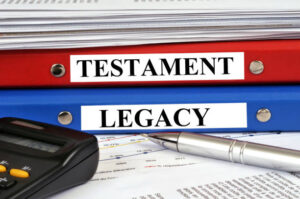Leaving a legacy is about more than just passing on money; it’s about ensuring that your values, memories, and wishes are preserved for future generations. Did you know that a staggering 70% of families lose their wealth by the second generation, according to research from the Williams Group? If you want to ensure your loved ones receive the benefits of your hard work and achievements, estate planning is highly essential.
But how can you set up a plan that stands the test of time?
The Importance of Estate Planning

Estate planning is the process of preparing for the management and distribution of your estate during your life and after your death. This planning not only involves financial decisions but also the emotional and ethical implications of what you leave behind. According to a report from the National Institute on Aging, only 42% of Americans have a will. This statistic highlights a significant gap in understanding how important estate planning is in today’s society.
Why Estate Planning Matters
- Protects Your Family: Proper estate planning ensures your loved ones are taken care of financially when you’re no longer around. It can help reduce conflicts and stresses during a difficult time.
- Preserves Your Values: Through your estate plan, you can leave behind more than just money—your values, wishes, and lessons can be passed on through letters or trusts.
- Reduces Taxes and Fees: Strategic planning can minimize estate taxes and other expenses that can eat into your assets after you pass away.
In a world full of uncertainty, isn’t it comforting to know that you can take steps today to secure your family’s future? Let’s explore ten essential tips for successful estate planning.
1. Start Early
Starting your estate planning early allows you to make informed decisions about your legacy. According to a study by the American Bar Association, people who plan in advance have a better understanding of their wishes and goals. The earlier you start, the more time you have to make adjustments and ensure your plan fits your unique situation.
2. Create a Will
A will is a legal document that specifies how you want your assets distributed after you die. Research from LegalZoom reveals that 62% of Americans do not have a will. Without one, the state decides how your assets are divided, which may not align with your desires. Make sure to draft a will with a qualified attorney to ensure it’s properly constructed.
What to Include in Your Will:
– List of assets
– Names of beneficiaries
– Instructions for guardianship of children
– Funeral arrangements
3. Consider a Trust
Trusts are an effective estate planning tool that can help avoid probate, maintain privacy, and minimize taxes. “A trust can provide clarity and control about the distribution of your assets,” says Patricia Johnson, a certified estate planner. Trusts can be revocable or irrevocable, depending on your needs.
Benefits of Setting Up a Trust:
– Avoids lengthy probate process
– Reduces estate taxes
– Provides for minor children or pets
4. Appoint an Executor
Your will should designate an executor—the person who will carry out your wishes after your death. This individual should be trustworthy and willing to manage your estate. According to a survey by Finder, 48% of adults have never discussed estate planning with their family. Open communication about these decisions can prevent family conflicts down the line.
Attributes of a Good Executor:
– Strong organizational skills
– Clear understanding of your wishes
– Ability to handle difficult family dynamics
5. Review Beneficiary Designations
Don’t overlook accounts like life insurance policies, retirement accounts, and bank accounts. These often have beneficiary designations that can supersede your will. A study from the AARP found that 63% of adults aged 40-79 say they haven’t checked their beneficiary designations in over five years. Regularly reviewing these can protect your intentions.
Steps to Update Beneficiary Designations:
– Contact each financial institution
– Review your designations every few years
– Update after major life events, such as marriage or divorce
6. Discuss Your Plans with Family
Talking about your estate plan can feel uncomfortable, but it’s essential to avoid misunderstandings later. Engaging in family discussions can reinforce your values and enhance relationships. A survey by the American Psychological Association found that families who communicate openly tend to resolve conflicts more effectively.
7. Keep Your Documents Organized
Ensure that all your documents are easily accessible. Create a centralized folder that includes:
– Will
– Trust documents
– Bank information
– Insurance policies
The National Institute on Aging advises keeping these documents in a safe but accessible place and informing your executor where to find them.
8. Plan for Healthcare Decisions
Healthcare directives are crucial components of estate planning. They ensure your wishes regarding medical care are honored if you become unable to communicate. According to a study published in the Journal of the American Medical Association, people with healthcare directives are more likely to receive the medical care they desire.
Types of Healthcare Documents:
– Living wills
– Power of attorney for healthcare
– Do not resuscitate (DNR) orders
9. Get Professional Help
Estate planning can be complex, so consider consulting with professionals like estate planners, lawyers, or financial advisors. They can provide tailored advice based on your specific situation. According to a report by the National Association of Estate Planners and Councils, working with professionals can lead to more effective plans and better outcomes for your heirs.
10. Regularly Review and Update Your Plan
Your estate plan is not a one-and-done process. As your life changes—whether through marriage, divorce, the birth of a child, or the acquisition of new assets—it’s crucial to regularly update your plan. Experts recommend reviewing your estate plan at least every three to five years, or after any major life event.
FAQs
Q1. What is estate planning?
A: Estate planning involves making legal arrangements for the management and distribution of your assets after your death. It includes creating a will, setting up trusts, and designating beneficiaries.
Q2. How do I start the estate planning process?
A: Begin by taking inventory of your assets, determining your goals, and consulting with a qualified estate planner or attorney.
Q3. How much does estate planning cost?
A: Costs can vary significantly, depending on the complexity of your estate and the services provided. Basic wills can start as low as $100, while comprehensive planning can cost thousands.
Q4. Can I create a will without a lawyer?
A: While it is possible to create a will without legal assistance, it’s often best to consult with a lawyer to ensure your will meets all legal requirements.
Q5. What happens if I die without a will?
A: If you die without a will, your assets will be distributed according to state laws, which may not reflect your wishes. This process can also lead to family disputes.
Leaving a legacy means more than just wealth; it’s about sharing your values and aspirations with future generations. By following these ten essential tips for successful estate planning, you can rest assured that your wishes will be honored, and your family will be taken care of. As you embark on this journey, remember: a well-thought-out estate plan can provide peace of mind for both you and your loved ones. Have you started planning your legacy today?
–
Links to check out:
– [National Institute on Aging](https://www.nia.nih.gov/)
– [American Bar Association](https://www.americanbar.org/)
– [AARP](https://www.aarp.org/)
– [LegalZoom](https://www.legalzoom.com/)
The journey towards leaving a strong legacy starts today, so why wait? Embrace estate planning, and empower your family’s future!









9ru08r
dtx773
4jikfg
c12fx3